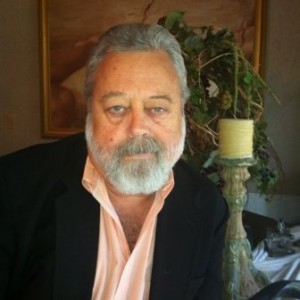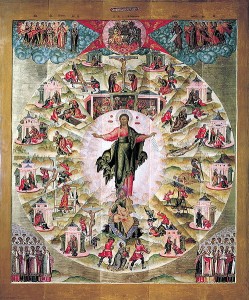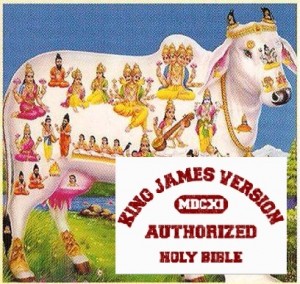Unfortunately, Rob Skiba has fallen under the false teaching of a cultic pseudo-scholar named Russ “Pappy” Houck. Houck has written a book entitled: EPIDEMIC: Examining the Infected Roots of Judaism and Christianity that appears to be the source of Rob’s theological errors. Rob has promoted Houck on his radio show and says that Houck “changed his life.” This is most unfortunate for Mr. Skiba. Please do pray for him. One can go to Amazon.com and browse through the book here. On page 356, I was able to locate the probable impetus of Skiba’s Trinitarian heresy – denying the personhood of the Holy Spirit.
Houck demies the trinity explicitly and thoroughly. On page 382, he argues that Jesus, “was never co-equal with the Father, YHWH, and is not part of Trinity godhead.” Rob Skiba’s main argument against the person of the Holy Spirit also comes from this book. Houck writes, “I realized that if there are three persons, as taught in Triniatrianism, then Yeshua (Jesus) is not the son of the Father, but the son of the Holy Spirit.”[2] Of course, I previously refuted that misunderstanding here. The book is full of similar misinformation. Houck writes, “I discovered that, …in the name of the Father and of the Son and of the Holy Ghost… (Mat. 28:19) was not in any of the early manuscripts.”[3] Houck falsely claims that Constantine added the Trinitarian formula to Matthew 28. This is simply not true because all extant manuscripts contain the phrase “baptizing them in the name of the Father, and of the Son, and of the Holy Ghost.” Not a single textual variant is listed in the critical Greek New Testament:
19 πορευθέντες οὖν μαθητεύσατε πάντα τὰ ἔθνη, βαπτίζοντες αὐτοὺς εἰς τὸ ὄνομα τοῦ πατρὸς καὶ τοῦ υἱοῦ καὶ τοῦ ἁγίου πνεύματος, [4]
It’s not missing from any manuscript. This is more than shoddy research…
Furthermore, early citations from the Church Fathers bear this out:
Ignatius lived in the first century, the time of apostles. The second chapter of his “Epistle to the Philippians” reads “He sent forth the apostles to make disciples of all nations, commanded them to “baptize in the name of the Father, and of the Son, and of the Holy Ghost.”[5]
Tertullian, (c. 200 AD) a century before Constantine, writes in On Baptism, “sealed in (the name of) the Father, and the Son, and the Holy Spirit,”[6]
Thus, Houck’s claims are patently false. It leads one to seriously question his claimed academic credentials. A real scholar would not make such obvious blunders. Unfortunately, it only gets worse.
Apparently, Mr. Houck sacrifices a lamb every Passover. This makes the Roman Catholic repeated Eucharistic sacrifice almost seem sound… well almost. For the record, I have written strongly against the mass as a sacrifice here. It is not my desire to misrepresent what Skiba and Houck believe. I am aware that they believe this as an act of remembering Jesus sacrifice for their sins, incidentally the same excuse the Roman Catholics use for parsing the Eucharist as a sacrifice. It’s not the remembrance that is troublesome, it is that Houck implies it is a requirement. Houck really seems to think he is bound to kill a animal on passover. Perhaps, someone can enlighten us as to just why this is required? At the 1:26:00 mark forward in the video below, Skiba and Houck discuss the annual Passover sacrifice on Houck’s Texas ranch.
Skiba: As the one who facilitates that in your home, what is that like? And how does that help you, first of all understand the Father’s heart but secondly how does that help you not even to want to sin anymore?
Houck : Well that’s the words I used to you, it makes you not want to sin anymore. It’s the hardest thing I’ve ever done. Every year, it’s the hardest thing we’ve ever done. I’m not a hunter. I’m not a fisherman. I don’t enjoy killing anything either and never have. I live out on a ranch so I have to kill varmits and I get no pleasure in even killing varmits. It is not about pleasure at all, it’s about obeying a commandment[7]and I can tell you that when I take that knife and cut the throat of the lamb, um, it is eh… I have worked hard to try and figure a way to get out of this, ok? Don’t let anybody kid you, the first time you do it, it is a mind boggling experience and I’m not trying to be funny. I’m being honest, it is absolutely… you sit there and you go… you can’t believe what you do and you can’t believe the reaction. And if you choose a sheep verses a goat cause it says you can do either, the little sheep will just stand there and do nothing. I mean there’s no resistance, there’s no fight, there’s no nothing… and you literally go into a spiritual place, that again, when you finish you know why Constantine wanted to take it away from us. Because it gives you the understanding, a spiritual precept, and here’s a statement that I have made many times, you can talk about well, did the Jews kill Jesus? Did the Romans kill Jesus? Who killed Jesus? Right? The fact is I killed Jesus, ok?, my sin. He said he dies for my sin. That means he had to die, his blood was spilled for me. And when I kill that lamb, I reiterate the fact that his blood was spilt for me. [8]
The above text was transcribed from time mark 1:27:30 – 1:29:59. I transcribed more than was necessary in order to fairly represent the context of what he was saying. I allow that Houck ostensibly claims to believe that Jesus died for his sins. But what does he mean by saying it is commanded that he do this? And that he has tried to find a way out of it but that is not an option? Nothing in New Testament remotely implies New Covenant believers are to sacrifice animals, in fact, the exact opposite is clearly taught.
The book of Hebrews makes it clear that the sacrificial system was done away with at the cross.
“And every priest stands daily at his service, offering repeatedly the same sacrifices, which can never take away sins. But when Christ had offered for all time a single sacrifice for sins, he sat down at the right hand of God, waiting from that time until his enemies should be made a footstool for his feet. For by a single offering he has perfected for all time those who are being sanctified.” (Heb 10:11–14)
If you have any doubts about this, please study Hebrews chapters nine and ten. Like with the Baptismal formula, Houck also claims the Constantine was the one who removed the practice of animal sacrifice. That is utter nonsense, divorced from any semblance of historical reality. The New Testament alone abolished the practice of animal sacrifice. Christians no longer have to offer animal sacrifices and keep other ceremonial parts of the OT laws, they are abolished: “He does away with the first in order to establish the second.” (Heb 10:9) In order to establish the second means the old covenant was abolished in light of the new. “In speaking of a new covenant, he makes the first one obsolete. And what is becoming obsolete and growing old is ready to vanish away.” (Heb 8:13) The sacrifices were abolished in order for God’s moral and spiritual will to be done. Constantine had nothing to do with it. Houck is dangerously mistaken.
In the book of Acts, the early church met to decide if gentile Christians were bound to keep the law. James stood up and said:
“Therefore my judgment is that we should not trouble those of the Gentiles who turn to God, but should write to them to abstain from the things polluted by idols, and from sexual immorality, and from what has been strangled, and from blood.” (Ac 15:19–20)
Paul also makes this clear in passages like: “For the law of the Spirit of life has set you free in Christ Jesus from the law of sin and death.” (Ro 8:2) Even worse for Houck, when the Galatian Judaizers attempted to add circumcision to the Gospel, Paul replied, “You are severed from Christ, you who would be justified by the law; you have fallen away from grace.” (Ga 5:4) If merely adding the requirement of circumcision to the Gospel results in being “severed form Christ,” I shudder to imagine what the requirement of animal sacrifice might entail.
[1] Russ Houck., Epidemic Examining the Infected Roots of Judaism and Christianity: How Do We Find God with All This Mess? (volume 1) (Corsicana, TX: Negev Publishing, 2012), 365.
[2] Houck, Epidemic, 354.
[3] Houck, Epidemic, 354.
[4] Kurt Aland, Matthew Black, Carlo M. Martini et al., The Greek New Testament, Fourth Revised Edition (With Apparatus) (2000; 2006), Mt 28:19. Also see: http://www.tektonics.org/lp/matt2819.html
[5] Ignatius of Antioch, Epistle of Ignatius to the Philippians Chapter II.—Unity of the three divine persons. http://www.ccel.org/ccel/schaff/anf01.v.xvii.ii.html
[6] Tertullian, On Baptism Chapter VI.—The Angel the Forerunner of the Holy Spirit. Meaning Contained in the Baptismal Formula. http://www.ccel.org/ccel/schaff/anf03.vi.iii.vi.html
[7] What commandment requires animal sacrifice for New Covenant Christians?
[8] “Epidemic: Exploring The Infected Roots of Judaism and Christianity – Dr. Russ “Pappy” Houk” Revolution Radio Projecy with Rob Skiba http://www.youtube.com/watch?v=u5BpJdCK9yc 1:27:30 – 1:29:59









